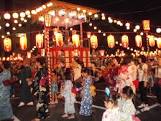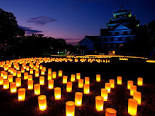英語で日本の夏の風物詩の1つ「お盆」を紹介します。夏に行われる日本の祖先の霊が家に帰るとされる行事で、日本古来の仏教の行事。かつては太陰歴の7月15日を中心に行われていたが、現在では太陽暦の8月15日を中心として行われることが多い。日本人の真夏の民族大移動ともいわれる時期で、8月13日から16日までの期間。企業、商店、病院やレストランなども休みになることが多い。帰省などして家族一同に集まる大切な期間。13日に迎え火を焚き、16日に送り火で先祖の魂を墓へ送る。また15日か16日の夜に「盆踊り」をするのは先祖の供養もあるが現在ではご近所との社交として楽しまれている。
The Obon holiday is a period when the Japanese traditionally welcome their ancestors’ on August 13th and send them back on the 16th. Japanese are able to take a long holiday at the time, and then they often go back to their hometown or travel around. Companies,shops,hospitals and restaurants,etc are closed during this period. It is precious time to family gathering on this time.
お盆 – OBON
毎年お盆はやってくる。日本の夏にかかせない夏の風物詩である。”お盆”はもともと霊を乗せるための容器と言う意味からきている。仏教行事で8月13日から16日。先祖の霊が家に帰ってくるということで、きゅうりで馬、ナスで牛を作り、仏壇に飾り、家族一同が一緒に過ごす大切な休み。日本人民族大移動の1つであり、帰省のために新幹線や電車や高速道路が大変に混雑する。また企業や商店や病院、レストランなども休みになることが多い。帰省したり、旅行に行ったりする。この時期は休みが取りにくいとされる会社員でも年に2回のやや長めの休みが取れる数少ない時期である。
“Obon”is one of most famous Japanese summer tradition. An “obon” was originally a container with which people served an offering to spirits of ancestors. According to one explanation, it is the name used for them at the memorial service. During this time between 13th and 16th of August, it is very important season for Japanese family gathering.
This season is very crowed in Bullet train,highway due to returning people all over Japan,especially from Tokyo. During this period, Japanese salaried men can rather easily take longer holiday thanks to Obon, as they normally can’t take long holiday so often.
In some regions, fires called mukae-bi are lit on the 13th of August at the entrances of houses, to guide the spirits of the residents’ancestors home. Some people make a horse out of a cucumber and a cow out of an eggplant, and use them to decorate their altar and welcome their returning ancestors. Okuri-bi is fires to guide ancestors’ spirits back to their grave on the 16th of August.
13th of August 迎え火/Fires to welcome the spirits of ancestors

16th of August 送り火/Fires to guide ancestors’ spirits back to the grave
盆踊り/Bon folk dance
盆踊りは、文献に最初に登場するのは室町時代と言われているが、平安時代、空也上人によってはじめられた踊念仏が、民間習俗として念仏踊りとなり、死者の供養の意味合いを持つ。鎌倉時代、念仏で救済される喜び踊る宗教的意味合いから、室町時代からは、さらに芸能的な部分(衣装、音楽、道具等)が強調されるようになった。盆踊りは通常は8月15日、16日の夜に開催され、和太鼓でリズムを取り、浴衣を着て踊る、のが日本の夏の風物詩として有名である。
“Bon odori”can be seen a document from Muromach period, but from Heian period, Kuya Shonin created basic Bon odori. Bon odori is widely practiced on the 15th and 16th at night and is one of the climaxes of Obon. People gathering with their neighborhood bon odori wearing yukata(summer kimono) and dance around a stage. Usually wa-taiko, Japanese drums. In Muromachi period Bon odori was stressed more entertainment parts such as yukata, music, and tools, etc., instead of religious parts.

※無料メール講座 「あいさつで終わらない!中学英語でできるグローバル雑談6つのテクニック」はこちらから

